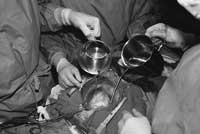In construction of artificial liver
Researchers are testing the necessary supports for human cells to survive out of the body, controlling their structure, temperature, and medium chemical to create an environment conducive to cell growth. Now, researchers at the University of California have managed to have liver cells live and function on silicon supports.

Although cancer cells grow easily in cultures, the survival of normal cells is much more difficult. However, in these silicon bioreactors, each cell is placed in a suitable structure thinner than a hair, and from the pores introduce the chemicals that need the food and the cell. Waterproof to viruses and bacteria.
Although the aim of the researchers is to obtain artificial liver, the first application of silicon bioreactors will consist in testing the toxicity of drugs. One of the most important functions of the liver is the division of drugs and drugs so they can act or be expelled from the body. Normally, the clinical value of a drug is determined after the observation of liver metabolism and, if toxicity tests can be performed in the bioreactor, it is possible to avoid testing drugs in animals. In addition, it is possible to test drug interactions by placing two or more drugs in the bioreactor at a time.
Thanks to this achievement, new ways are opened to combat liver diseases and to test drugs and drug toxicity.





